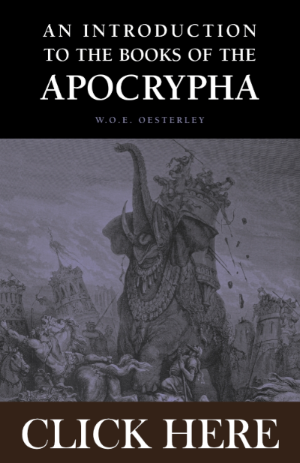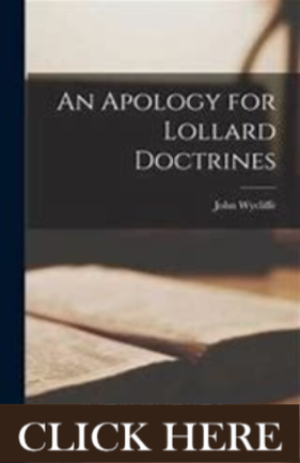John Wycliffe - WYC Books
Welcome to John Wycliffe - WYC Books at Christ the True Light—your dedicated source for the influential works of and about John Wycliffe, the groundbreaking theologian who brought Scripture to the people. Here, you'll find a selection of Wycliffe's translated scriptures, commentaries, encyclopedias, the Apocrypha, and writings by others exploring his life and legacy. Each download is available for FREE.
Across the site, you’ll also find many more free downloads which are supporting materials that offer deeper insights into the biblical truths I share. However, this page is devoted exclusively to Wycliffe’s works and writings about him, providing a unique way to help preserve and share his enduring legacy. I want to thank you for your support in this mission!
Apocrypha: Historical Context
The term "Apocrypha" generally refers to ancient texts not included in the canonical Bible for most Christian denominations, though what is considered “apocryphal” varies across traditions. Derived from the Greek word "apokryphos ", meaning "hidden" or "secret," these writings encompass narratives, wisdom literature, and prophecies attributed to inspired figures or early disciples. www.blueletterbible.com - Lexicon: Strongs
Matthew 13:35 that it should be fulfilled, that is said by the prophet, saying, I shall open my mouth in parables; I shall tell out hid G2928 things from the making of the world. WYC 1382
Mark 4:11 And he said to them, To you it is given to know the private G3466 of the kingdom of God. But to them that be withoutforth, all things be made in parables, WYC 1382
Mark 4:22 [Forsooth] There is nothing hid, G2927 G5100 that shall not be made open; neither any thing is privy G614, that shall not come into open. WYC 1382
Colossian 2:3 in whom all the treasures of wisdom and of science G1108 be hid. G614 WYC 1382
Colossian l 2:3 In whom are hid all the treasures of wisdom and knowledge. G1108 KJV
The challenge in today’s religious world is that certain hidden insights remain beyond reach. While Jesus shared wisdom through parables, my approach is to speak openly. Spiritual gifts are not mine to bestow, yet I deeply wish that everyone could receive true enlightenment. However, as these gifts and truths have often been kept hidden, our world faces significant challenges because of it. We have a serious problem; CHRIST IS IN DANGER! I understand how unusual that may sound, so please allow me the opportunity to explain what I mean, by reading this link HERE.
Ephesians 1:17 that God of our Lord Jesus Christ, the Father of glory, give to you the spirit of wisdom and of revelation, G602 into the knowing of him;
revelation, G602 - apokalypsis - to lighten
The word science G1108 in Colossian 2:3 is replaced by the word knowledge. G1108 in our newer text. This is the Tree of Knowledge we were not supposed to bite of. I call it "Egyptian Science" because sciences earliest roots are traced back to Mesopotamian and Egypt. And this science of knowledge found in our conscious minds has led to conscious AI, the beast.
Apocrypha: Significance
In Judaism and early Christianity, these writings were widely read and considered significant. However, debates over which books were divinely inspired and carried Christ’s authority as the "Word" led early church councils to create a standardized biblical canon, excluding the Apocrypha from some traditions. The Protestant Reformation further distinguished these books from the Protestant Bible, with reformers like Martin Luther advocating their exclusion while acknowledging their value for moral teaching.
Books often classified as Apocrypha include 1 and 2 Esdras, Tobit, Judith, Wisdom of Solomon, Ecclesiasticus (Sirach), Baruch, and 1 and 2 Maccabees. Though not universally canonical, these texts explore themes like divine wisdom, justice, and the trials of Israel, reflecting divine interactions and moral teachings attributed to "The Most High." Some Christian traditions, including Catholicism and Eastern Orthodoxy, incorporate parts of the Apocrypha in their Old Testaments, while others regard it as non-canonical but valuable for insights into faith and early interpretations of God’s message.
These texts hold spiritual wisdom and principles often associated with Christ’s teachings. Many early Christians and theologians interpreted the Apocrypha as bearing moral and prophetic significance that complements the canonical scriptures.
John Wycliffe and the Apocrypha
John Wycliffe was an early translator and reformer who championed making the Bible accessible to all, especially through his English translation of the Latin Vulgate. His translation, completed in the late 14th century, included both canonical books and the Apocrypha, as was customary for the Vulgate Bible.
Wycliffe viewed all of Scripture—including the Apocrypha—as valuable for study and spiritual growth. His inclusion of these texts reflects a medieval perspective that the Apocrypha could offer moral and theological insights beneficial to believers.
Wycliffe’s work involved translating and circulating the entire Bible, which, in his time, included both canonical and apocryphal books. Wycliffe’s commitment to translating everything in the Latin Vulgate likely stemmed from his desire to offer people access to all of Scripture as it was traditionally read and understood. In this mission, he simply translated the texts as part of his larger goal to make Scripture accessible to the laypeople.
Books
Rate This Page:
Help Me Spread Christ's Message!
Please Share This Post! I Am Relying on You to Help Me Reach People!
Subscribe FREE to receive email updates.
Leave a comment and start a conversation below.
Email me at suzanne@christthetruelight.com












Add comment
Comments